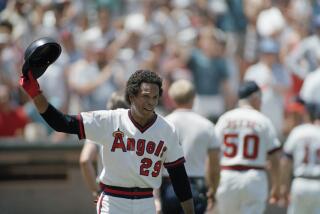Winfield Has Seen It All
- Share via
ANAHEIM, Calif. — Dave Winfield has streaks of gray around the temples and in his beard these days, and the careful, pensive manner in which he chooses his reflective words leaves the impression that he has become a clubhouse sage of sorts. Years of virtually ceaseless duress and unending battles will leave scars, even on a man with keen survival instincts.
The topics he covers are familiar to the California Angels’ 38-year-old outfielder: conflict, persecution, retribution and the like. He’s still talking about these subjects because he can’t escape them.
Winfield can’t flee from the begrudging, roundabout manner in which respect and recognition always have come his way, from the rap of being self-centered that seems to accompany his unyielding personality or, most troublingly, from George Steinbrenner and the often-nightmarish memories of a nine-year stay in the “Bronx Zoo” that refuse to sink into the past.
He has the width of the country between him and Steinbrenner, the owner of the New York Yankees, and still the fiasco continues. Winfield was traded to the Angels in May, but his long-running warfare with Steinbrenner persists. Commissioner Fay Vincent’s removal of Steinbrenner as the Yankees’ managing general partner effective Monday was based on Steinbrenner’s payment of $40,000 to admitted gambler Howard Spira in January, apparently for providing damaging information about Winfield.
The saga doesn’t end there, however. Sports Illustrated reported in its Aug. 13 issue that one-time associates of Winfield and his former agent, the late Al Frohman, contend that Winfield bet on sporting events other than baseball games and lent Spira $15,000 in 1981 to pay off gambling debts.
Winfield has admitted to lending the money to Spira, who formerly was involved with the charitable Dave Winfield Foundation. But he said he didn’t know at the time Spira was a gambler and that he made the loan at Frohman’s request without knowledge of what the money was for. He said he has not and does not bet on sports.
And, he adds, he’s quite annoyed that the accusations even are being made. Vincent and his investigator, Washington attorney John Dowd, said in response to the Sports Illustrated report that the allegations against Winfield had been explored and were without substance.
“The only investigating that needs to be done is to see who’s saying these completely untrue things about me,” Winfield said. “They’re absolute lies. I don’t appreciate it, and I don’t like it. True or not, it’s damaging. ... There’s nothing I did to create this or cause this.
“This has damaged me a lot -- not just this latest thing, but everything through the years. I am a survivor, but it takes its toll.”
Winfield views the matter as the sad but predictable ending to his tempestuous relationship with Steinbrenner. Of course, he had believed that the ending had come when the Yankees were fined $250,000 for Steinbrenner “tampering” with Winfield after the trade to California was completed. So this qualified as a pitiable epilogue.
Winfield does not gloat publicly about Steinbrenner’s downfall, but neither does he come close to sympathy for his former boss. He shakes his head and smiles at accounts of many Yankees players expressing regret and sorrow when the Steinbrenner verdict was announced.
“Some people tried to paint the picture of a good man being too harshly punished,” Winfield said. “The New York fans didn’t buy that. They were happy to see him go.
“Everyone has their opinion. I truly know what he’s all about. No one knows that man like me. I know what he is. Let’s just say I’m glad baseball looked into things like they did and I’m glad justice was served.”
The Winfield-vs.-Steinbrenner clashes were epic in their intensity and longevity. Winfield was seeking a national stage for his abundant talents when he went to New York in 1980 after eight seasons with the San Diego Padres. He had no idea what he was getting into.
He played eight seasons for the Yankees before missing all of 1989 after surgery to repair a herniated disk in his back. He compiled a .291 batting average for New York, with 203 home runs and 812 RBI. Not counting his strike-shortened first season, he averaged 27 homers and 106 RBI per year.
And for much of his Yankees tenure, he was perhaps the best defensive outfielder in the game whether he played left field or right.
But always there was conflict with Steinbrenner. The two haggled over Winfield’s contract even after he had signed with the Yankees, and they were in court within a year because Winfield said Steinbrenner failed to deliver promised money to the Winfield Foundation.
Steinbrenner bashed Winfield publicly, saying that if Reggie Jackson was “Mr. October,” then Winfield was “Mr. May.” He called Winfield an underachiever, and never allowed him to forget his two-for-13 performance in the 1981 American League Championship Series or his one-for-22 showing in the subsequent World Series.
Winfield told those around him he didn’t know how long he could endure the Yankees atmosphere, yet he persevered -- and mostly prospered. Of course, Winfield’s record was not spotless, either. He still carries a reputation in some circles for selfishness and for being a divisive force in a clubhouse.
His 1988 autobiography triggered a controversy when he wrote that former teammate Willie Randolph had told him once that “you can be a ‘good’ Yankee and a well-respected one. But as a black man, you’re never going to be a ‘true’ Yankee.”
Randolph has said the conversation was misinterpreted by Winfield, and that -- though the two still are friends -- the book has caused a certain uneasiness between them. Winfield left with a bitter relationship with much of the New York media, conducting tussles that some former Yankees teammates have said became wearisome.
“It was just a real bad situation for Dave before he got out of here,” Yankees relief pitcher Dave Righetti said recently. “You don’t want to point the finger of blame. ... I like Dave and I have no problems with George. You don’t really like to be caught in the middle. It was just a bad situation, that’s all.”
The beginning of the end for Winfield in New York came when since-fired manager Bucky Dent made him a part-time player at the beginning of this season. When he was dealt here for pitcher Mike Witt May 11, he was batting .213 with six RBI in 20 games. Steinbrenner, who was unavailable for comment the past several days, accompanied the trade by saying Winfield’s best days were behind him.
“The fans in New York and I, we were fine,” said Winfield, who predicted a warm reception when the Angels visit Yankee Stadium Sept. 3, his initial return trip. “If I could’ve ended my career there, I would’ve done it.
“But (Steinbrenner) wouldn’t allow that. He tried to get my playing time reduced for the last five years. I asked him three times over the years what his problem with me was, and he never had an answer. It gets to be too much for one individual to take.”
Steinbrenner’s contention that Winfield’s prime has passed may be true, of course. He is, after all, old enough that he has a former teammate as his manager here. He batted .322 with 25 homers and 107 RBI as recently as 1988, but that was before the back injury.
His slow start is transforming into a respectable season. He adjusted his stance after watching videotapes of his 1987 swing, and his average is .260, with 14 home runs and 47 RBI.
The Angels say they’ve gotten not only the positive clubhouse influence they were seeking, but an everyday right fielder and still-consistent run producer as well.
“The stuff about being a presence is nice and all, but it only goes so far,” said Manager Doug Rader, whose Padres career was ending as Winfield’s was beginning. “It has to be backed up. To Dave’s credit, he’s done that.”
But still there is no peace for Winfield. Even his 2,500th career hit earlier this month failed to bring instant gratification. It was a homely-for-a-milestone ground ball that bounced off Boston Red Sox second baseman Jody Reed en route to the outfield, and Winfield had to wait several moments to see if the play would be scored a hit or an error.
He said he plans to play beyond the three years his contract has been extended, and that he conceivably could go five or six seasons more. Three thousand hits and the Hall of Fame are within reach. But for now, Winfield wants to enjoy a comparatively carefree atmosphere and play some baseball that will silence his critics for good.
“New York made me a better player,” he said. “You had to be ready to produce something every minute, every play. I think my legacy with them will be that I never backed down from that. ... But now it’s nice just to come to the ballpark every day and be relaxed. You can focus on the game, not all the other stuff. I can appreciate more than anyone what that means.”
More to Read
Go beyond the scoreboard
Get the latest on L.A.'s teams in the daily Sports Report newsletter.
You may occasionally receive promotional content from the Los Angeles Times.





